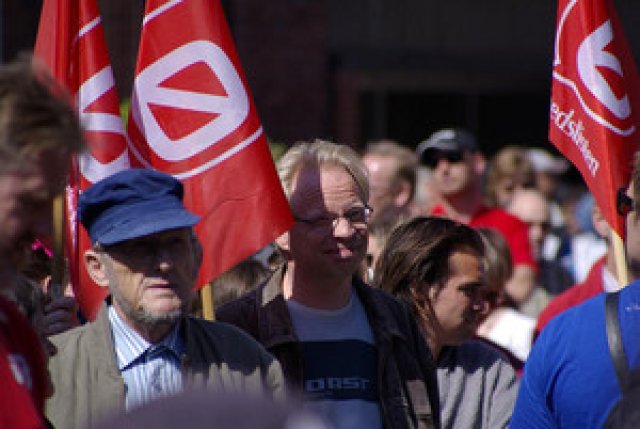
The Danish Red-Green Alliance (RGA) marked 25 years since its founding at a national conference on May 16 to 18.
A radical left unity project marking 25 years in existence is itself a cause for celebration, but this conference was able to celebrate much more. After about 20 years as a fringe party in Danish politics, the RGA has recently emerged as a significant force.
In elections in 2011, the party tripled its presence in parliament from four seats to 12, jumping from 2.2% to 6.7% of the vote. In last year’s municipal elections, the RGA hugely expanded its presence, winning representatives in almost all municipality and regional councils.
And the RGA is set to expand further in parliamentary elections in September. It is polling at about 11%, making it potentially the fourth-largest force in Danish politics.
With the growth in influence, scope and members, this year’s congress was largely focused on making steps to become a mass party of the left.
A key discussion was over the party’s program. At last year's congress, delegates voted to start a process of writing a new program for the party.
While retaining the group's essential politics, the aim was for a new program to be written in a style and language more easily accessible to people not familiar with Marxist politics. RGA executive member Pia Boisen said: “We want this program to be readable by a young boy in the countryside, or an ordinary worker in the city.”
After a six-month period of discussion, two drafts were debated at this year's Congress. Further amendments were made before a new program was adopted with a resounding majority.
At the same time as clarifying the democratic nature of the socialism that the RGA supports, the new program maintains a commitment to anti-capitalist politics, revolutionary transformation, an ecological vision, and social and international solidarity.
The new program is only 10 pages long, and is accompanied by three partial programmatic documents dealing specifically with women’s rights, the environment, and the European Union.
Debates about the program centred on a couple of key issues, such as the nature of the state under capitalism, how to relate to the welfare state and what position to take with regard to NATO-led interventions.
As well as a new program, the conference adopted a “work plan” for the next period. This plan emphasises the importance of strengthening work in the municipal and regional branches, many of which have only recently been set up after electoral victories.
The conference voted that at least one-third of party employees should be based in regional areas. Until now, all party workers have been based in Copenhagen.
The plan also outlined the need to strengthen the party, activate more new members, build a militant union network and step up international work.
With the European elections one week after the conference, a lot of discussion centred on the role of the EU and the RGA’s anti-EU stance.
The RGA works within The People’s Movement Against the EU coalition, which will run a slate of candidates at the upcoming election. Many candidates are also members of the RGA. The People’s Movement is currently polling around 7.2% and looks set to keep its one seat in the European parliament.
The RGA has been criticised by other left-wing parties in the EU for its anti-EU stance, but it says it is a question of self-determination.
Soren Sondergaard, People’s Movement representative in the European parliament from 2007-14, says the EU is not a democratic structure and cannot be reformed.
One issue that was frequently discussed in relation to the EU was “social dumping”. Corporations in Denmark are increasingly employing cheaper immigrant labour (often from Eastern Europe), putting pressure on wages in general.
Due to EU structures, unions are handicapped in their ability to respond. The bosses are pressuring the government to extend more social benefits to migrants as a way of enticing them over, while they can keep wages down.
RGA are organising campaigns against this, saying migrants should indeed receive full state support, but should also be paid full Danish wages.
They see leaving the EU as part of this fight.
Regardless of the debate over the strategic merits of advocating an exit from the EU or seeking to reform it, the RGA’s commitments to anti-capitalist politics, a truly ecological vision of society, and international solidarity were clear from the conference.
With a growing right-wing populist current in Denmark, the strengthening and expansion of the RGA could play an important role in turning public opinion towards more just, humane answers to the country’s problems.
[Liam Flenady represented Australia's Socialist Alliance at the congress.]
